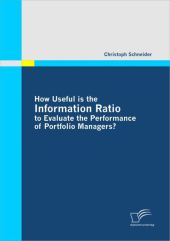 Neuerscheinungen 2010Stand: 2020-01-07 |
Schnellsuche
ISBN/Stichwort/Autor
|
Herderstraße 10
10625 Berlin
Tel.: 030 315 714 16
Fax 030 315 714 14
info@buchspektrum.de |

Christoph Schneider
How Useful is the Information Ratio to Evaluate the Performance of Portfolio Managers?
2010. 102 p. w. 15 figs. 27 cm
Verlag/Jahr: DIPLOMICA 2010
ISBN: 3-8366-8447-0 (3836684470)
Neue ISBN: 978-3-8366-8447-7 (9783836684477)
Preis und Lieferzeit: Bitte klicken
The idea of comparing the performance of different risky investments, for example investment funds, on a quantitative basis dates back to the beginnings of the asset management industry and has been an important field of research in finance since then. Performance measures serve as valuable quantitative evidence for the portfolio manager´s performance as well as for the evaluation of investment decisions ex post. Based on the idea of the capital asset pricing model proposed by Treynor, Sharpe and Lintner, Treynor developed the first quantitative performance measure intended to rate mutual funds, the Treynor Ratio. Since then, a large number of performance measures with very different characteristics have been developed. In addition to their power of rating investments ex post, their ability to predict future performance has been thoroughly analyzed by Grinblatt & Titman, Brown & Goetzmann, Carhart and others. Besides academia, the driving force behind the development of more sophisticated performance measures has always been the investors. This is understandable, as "the truly poor managers are afraid, the unlucky managers will be unjustly condemned, and the new managers have no track record. Only the skilled (or lucky) managers are enthusiastic".
By combining and applying the results of previous research to a new sample of nearly 10,000 mutual funds that invest in different countries and asset classes, this thesis clarifies its central research question: Is the Information Ratio a useful and reliable performance measure? In order to answer this central question, it has been split up into the following sub-parts: What are the characteristics of a useful and reliable performance measure? What actually is "good" performance? Is the "good" performance a result of luck or of skilled decisions and does it persist over time? How does the Information Ratio compare to other performance measures, and what are its strengths and weaknesses? This empirical study aims at answering all of these questions and provides a framework for performance evaluation by use of the Information Ratio.
Christoph Schneider, Jahrgang 1984, hat einen Master of Science in Finance Abschluss der European Business School, Oestrich-Winkel. Während der Studienzeit an der European Business School spezialisierte er sich insbesondere in den Themen Finance, Investments und Real Estate und absolvierte Auslandssemester in Oslo, Norwegen und San Francisco, USA. Er ist derzeit bei Morgan Stanley International im Investment Banking tätig.


